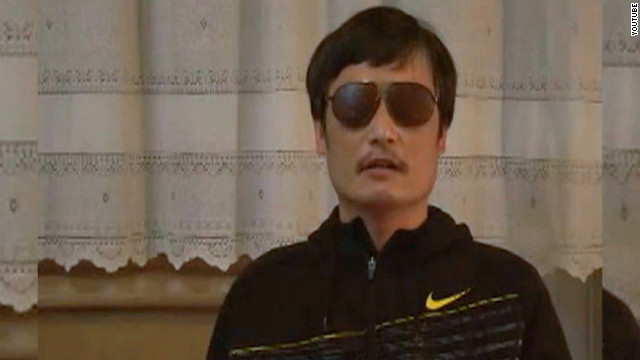
- U.S. diplomats are scheduled to visit Chen in hospital Friday
- "I want them to keep their commitment," Chen says of Chinese officials
- U.S. officials are trying to get a "clear view" of Chen's position
- Chen says he wants to go to the United States to "recuperate"
Beijing (CNN) -- U.S. diplomats are scheduled to visit a Chinese activist at the center of an international crisis Friday after he told U.S. lawmakers that he wants to leave China for the United States.
The visit to see Chen Guangcheng in the Beijing hospital where he is staying was disclosed by a U.S. official. It is part of the deal worked out between the United States and China under which Chen left the U.S. Embassy in Beijing, where he had taken refuge for six days after escaping from house arrest.
Since leaving the embassy for the hospital Wednesday, Chen has made several pleas to be allowed to leave China, adding confusion and complication to the diplomatic firestorm over his future.
"China pledged to guarantee my constitutional rights and called me a free man," Chen said, speaking from his hospital room early Friday in Beijing to congressional commission members who listened by speakerphone in Washington, 12 times zones and thousands of miles away.
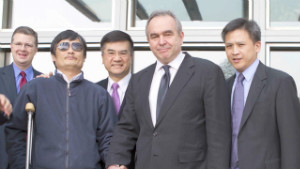 Did U.S. fail Chinese activist Chen?
Did U.S. fail Chinese activist Chen?  Rep. Smith on Chen's call to Congress
Rep. Smith on Chen's call to Congress 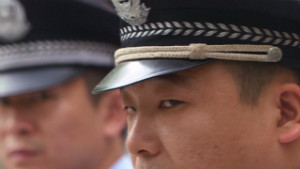 Security tight at Chen hospital
Security tight at Chen hospital 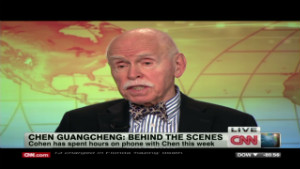 Friend of Chen: He wants his rights
Friend of Chen: He wants his rights "I want them to keep their commitment by allowing me to travel abroad to recuperate," Chen said. "I want to go to the United States and rest for a while, since I haven't had a Sunday in seven years."
The 40-year-old blind, self-taught lawyer added that he wants to meet with U.S. Secretary of State Hillary Clinton "to thank her in person."
Chen, Bo rewriting China's script
But he said he was worried about his relatives in his hometown in the eastern province of Shandong, which he fled last month. He said he has not been able to contact some of them and blamed Chinese officials for his living situation there.
"They have installed seven surveillance cameras in my house," he said. "In addition to have the guards stay in my place, they are building an electric fence around my house. They even scoffed, 'Let's see what this blind guy can do to us.' "
He asked that Congress help him ensure his relatives' legal rights are respected. "This is what concerns me greatly right now," he said.
In a telephone interview with CNN, Chen expressed optimism that U.S. officials would act on his behalf.
"I believe they will help me," he said.
Last month, the activist escaped house arrest in Shandong and made his way to the U.S. Embassy in Beijing. But he left it Wednesday for medical treatment in the hospital, where he was reunited with his wife and two children.
Before his escape, Chen had been forcibly confined to his home for 18 months after serving four years in prison, apparently over his legal advocacy for what he called victims of abusive practices such as forced abortions and sterilizations by China's family planning officials.
When Chen left the embassy, U.S. officials announced they had worked out a deal with China for his future and that Chen was leaving of his own free will.
The officials said the Chinese government had committed to relocate Chen to a "safe environment" away from the province where he and his family say they had suffered brutal treatment by local authorities. In addition, the officials said, China agreed to investigate those allegations of mistreatment and promised Chen would face no further legal issues.
Under the agreement, Chen was to be granted the opportunity to pursue university studies in the safe location. Gary Locke, U.S. ambassador to China, said one of the proposals "allowed for the possible transfer some day to an American college or university."
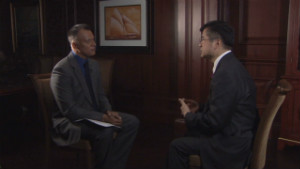 Ambassador Gary Locke on Chen's options
Ambassador Gary Locke on Chen's options  Romney criticizes handling of Chen affair
Romney criticizes handling of Chen affair 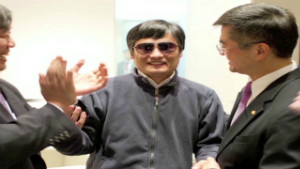 Chen's fate overshadows talks
Chen's fate overshadows talks 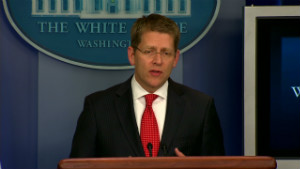 Human rights part of talks with China
Human rights part of talks with China But Chen subsequently said he regretted having abandoned the embassy and began making pleas through CNN and other international news organizations to U.S. officials to get him out of China.
His statements prompted bewildered reactions from U.S. officials who said the decision to leave the embassy was Chen's and that he had repeatedly said he wished to remain in China.
Did Obama betray a Chinese hero?
U.S. diplomats made efforts to contact him Thursday.
Chen said he had spoken by phone with U.S. representatives who had also met with his wife, Yuan Weijing.
He said the U.S. Embassy officials told him Chinese security personnel prevented them from entering his hospital room.
Chen mollified his tone compared with the comments he made Thursday, when he said he was "very disappointed" in the U.S. government because he felt American officials had lobbied for him to leave the embassy and abandoned him at the hospital.
He expressed "deep gratitude" to American officials in Beijing for having treated him "extremely well" during his six-day stay in the embassy.
Jerome Cohen, an American law professor and friend of Chen, offered an explanation for Chen's statements after he left the embassy.
"Everything changed when he got to the hospital," said Cohen, who advised Chen by phone while he was inside the embassy. "All of a sudden, the people who had worked so hard to secure his future from our embassy and our state department, they were tired as can be and they went home to sleep."
Some of Chen's fellow Chinese human rights activists spoke with him about his plan to remain in China, Cohen told CNN's Christiane Amanpour on Thursday.
"They said: 'This is zany. Don't do this. You're just totally unrealistic, it will never work,' " Cohen said.
Chen is "in a very fragile emotional state," Cohen said. "You have to understand the enormous pressures in which he's been living and recently operating. And it got to be too much."
The United States is now working out what Chen wants and how it might be able to assist him.
Once a clear understanding of his desires emerge, "we will do what we can to help him achieve that," a senior U.S. State Department official said Thursday.
A senior Obama administration official said that "there are ongoing discussions happening in Beijing," but declined to comment further.
Cohen said he was hopeful a deal could be reached to get Chen out of China.
"They're practical people," he said, referring to China's leaders. "They're going to want to get rid of him and his family in the most humane appearance possible."
Human rights advocacy groups meanwhile have questioned whether Beijing will stick to its promises about Chen's future if he stays in the country, noting that several of his friends and family members have been detained or are unaccounted for.
Visitors unwelcome in Chen's hometown
Chen's case has touched a nerve in China, where CNN International's broadcast has been blocked in recent days during the network's stories about him.
Chinese officials have not commented directly on his situation since Wednesday. Comments reported by state media have focused on "interference" by Washington.
"This is totally unacceptable to China," Liu Weimin, a spokesman for the Chinese Foreign Ministry, said in comments reported Wednesday by Xinhua, the state-run news agency. He demanded an apology from the United States.
Nevertheless, senior officials from the two countries -- including Clinton and Treasury Secretary Timothy Geithner -- met Thursday and Friday in Beijing for scheduled talks about strategic and economic issues.
In a speech, Clinton referred to human rights without mentioning Chen.
"As part of our dialogue, the United States raises the importance of human rights and fundamental freedoms because we believe that all governments do have to answer to citizens' aspirations for dignity and the rule of law and that no nation can or should deny those rights," she said.
On the Chinese side, President Hu Jintao said Washington and Beijing "should approach our differences in a correct way, and respect and accommodate each other's interests and concerns."
CNN's Jill Dougherty, Dan Lothian, Eunice Yoon, Jethro Mullen and Stan Grant contributed to this report.



